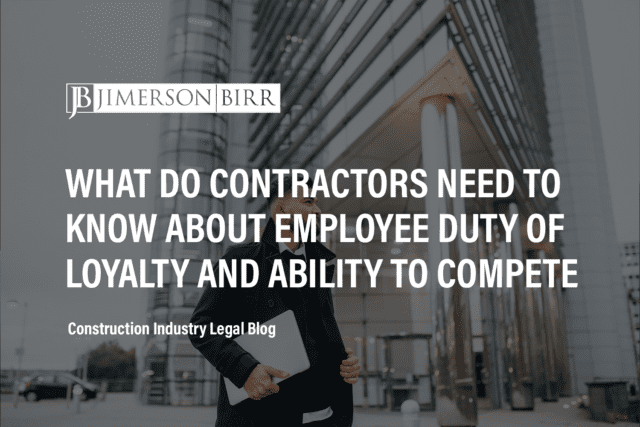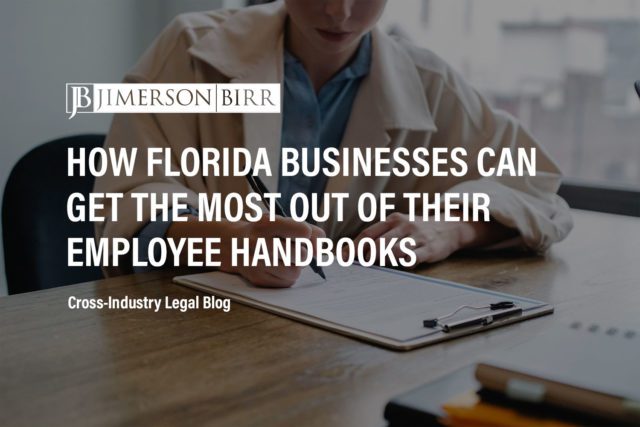What do non-compete and non-solicitation agreements encompass?
Non-compete and non-solicitation agreements are legally binding contracts that restrict employees from engaging in specific activities after their employment has ended. In Florida, non-compete agreements prevent employees from competing with their former employers within a certain geographic area and for a particular duration. In contrast, non-solicitation agreements prohibit employees from soliciting the former employer’s clients, customers, or employees.
For example, a software company in Florida may require its employees to sign a non-compete agreement that prevents them from working for a competitor within a 50-mile radius for two years after leaving the company. Similarly, a non-solicitation agreement may prohibit the former employee from contacting the company’s clients for business purposes within the same period.
Need help with training, compliance, or litigation to protect your workplace? Schedule your consultation today with a top employment law attorney.
Which laws, rules, and regulations apply to non-compete and non-solicitation agreements?
In Florida, non-compete and non-solicitation agreements are governed by the Florida Statutes Section 542.335, which outlines such agreements’ enforceability, requirements, and limitations. According to this statute, non-compete and non-solicitation agreements must be reasonable in time, area, and line of business to be enforceable. Additionally, these agreements must protect legitimate business interests, such as trade secrets, customer relationships, or specialized training.
Federal laws and regulations, such as the Defend Trade Secrets Act and the Antitrust Guidelines for Collaborations Among Competitors, also apply to non-compete and non-solicitation agreements. These federal laws help protect trade secrets and ensure fair market competition. Employers should consult legal counsel to ensure their non-compete and non-solicitation agreements comply with Florida and federal laws.
What are common issues associated with non-compete and non-solicitation agreements that lead to litigation against employers?
- Overly Broad Scope: One prevalent stumbling block arises when these agreements cast too wide a net. Courts may deem non-compete and non-solicitation agreements unenforceable if they exhibit an excessive scope concerning geographic area, duration, or the nature of restricted activities. Striking the right balance is crucial; an overly ambitious reach can tip the scales against enforcement.
- Lack of Legitimate Business Interest: Protecting a legitimate business interest is essential to the validity of such agreements. This can encompass safeguarding trade secrets, preserving customer relationships, or recognizing the cost of specialized training. These agreements become vulnerable to legal challenges when they lack a clear connection to such interests.
What are the prerequisites to file a lawsuit regarding non-compete and non-solicitation agreements, and what legal defenses may employers assert?
Legal prerequisites for employees to file a lawsuit regarding non-compete and non-solicitation agreements:
- Breach of the Agreement: The employee must allege that the employer breached the non-compete or non-solicitation agreement.
- Injury or Damages: Employees must demonstrate that they suffered injury or damages due to the alleged breach.
Affirmative legal defenses that employers commonly assert:
- Validity of the Agreement: The employer may argue that the non-compete or non-solicitation agreement is valid and enforceable; therefore, the employee’s claim lacks merit.
- No Breach of the Agreement: The employer may assert that they did not breach the non-compete or non-solicitation agreement.
- Waiver or Estoppel: The employer may argue that the employee waived their right to enforce the non-compete or non-solicitation agreement or that the employee is estopped from asserting a breach due to their conduct.
To determine whether your unique situation may necessitate litigation or another form of specialized advocacy, please contact our office to set up your initial consultation.
What measures must employers take to create valid non-compete and non-solicitation agreements?
To comply with the legal requirements of non-compete and non-solicitation agreements in Florida, employers must implement the following measures:
- Draft Reasonable and Enforceable Agreements: Ensure that the non-compete and non-solicitation agreements are drafted with reasonable restrictions on time, geographical scope, and business activities, as required by Florida Statutes Section 542.335.
- Protect Legitimate Business Interests: Employers must demonstrate that the agreements protect their legitimate business interests, such as trade secrets, valuable confidential information, or customer relationships.
- Provide Adequate Consideration: Offer the employee something of value in exchange for signing the agreement, such as a job offer, promotion, or access to confidential information.
- Review and Update Agreements Periodically: Regularly assess the validity and enforceability of non-compete and non-solicitation agreements to ensure they align with current Florida law.
Please contact our office to set up your initial consultation to see what forms of legal advocacy or intervention may be available for your unique situation.
Frequently Asked Questions
How long can a non-compete agreement last in Florida?
Florida law generally permits non-compete agreements to last for a reasonable period of time. Under Florida Statutes Section 542.335, courts typically uphold agreements of six months to two years, depending on the circumstances.
Can an employer enforce a non-compete agreement if an employee is terminated without cause?
Yes, an employer can still enforce a non-compete agreement in Florida even if the employee is terminated without cause. However, the court will still scrutinize the reasonableness of the agreement’s terms and the employer’s legitimate business interests.
Are non-compete agreements enforceable against independent contractors in Florida?
Yes, non-compete agreements can be enforced against independent contractors in Florida, provided that the agreement is reasonable in scope, duration, and geographic area and protects the employer’s legitimate business interest.
Have more questions about employment law training, compliance, or litigation?
Crucially, this overview of non-compete and non-solicitation agreements does not begin to cover all the laws implicated by this issue or the factors that may compel the application of such laws. Every case is unique, and the laws can produce different outcomes depending on the individual circumstances.
Jimerson Birr attorneys guide our clients to help make informed decisions while ensuring their rights are respected and protected. Our lawyers are highly trained and experienced in the nuances of the law, so they can accurately interpret statutes and case law and holistically prepare individuals or companies for their legal endeavors. Through this intense personal investment and advocacy, our lawyers will help resolve the issue’s complicated legal problems efficiently and effectively.
Having a Jimerson Birr attorney on your side means securing a team of seasoned, multi-dimensional, cross-functional legal professionals. Whether it is a transaction, an operational issue, a regulatory challenge, or a contested legal predicament that may require court intervention, we remain tireless advocates at every step. Being a value-added law firm means putting the client at the forefront of everything we do. We use our experience to help our clients navigate even the most complex problems and come out the other side triumphant.
If you want to understand your case, the merits of your claim or defense, potential monetary awards, or the amount of exposure you face, you should speak with a qualified Jimerson Birr lawyer. Our experienced team of attorneys is here to help. Call Jimerson Birr at (904) 389-0050 or use the contact form to schedule a consultation.
Here are some blogs written by JB attorneys that provide more information about employment law:
- Independent Contractor or Employee: Know the Difference (jimersonfirm.com)
- Rescinding Job Offers in At-Will Employments in Florida | Jimerson Birr (jimersonfirm.com)
- Tips for Drafting Employee Handbooks in Florida | Jimerson Birr (jimersonfirm.com)
- Understanding The EEOC Process: Employee Sexual Harassment And Sexual Discrimination Claims In The Era Of #MeToo (jimersonfirm.com)
- Contesting OSHA Violations and OSHA Citations: A Guide To OSHA Employer Rights (jimersonfirm.com)
- What Do Contractors Need to Know About Employee Duty of Loyalty and Ability to Compete | Jimerson Birr (jimersonfirm.com)

We live by our 7 Superior Service Commitments
- Conferring Client-Defined Value
- Efficient and Cost-Effective
- Accessibility
- Delivering an Experience While Delivering Results
- Meaningful and Enduring Partnership
- Exceptional Communication Based Upon Listening
- Accountability to Goals











